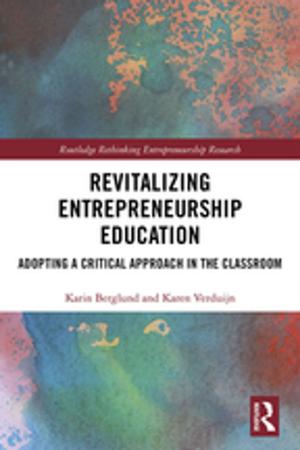The Globalization and Corporatization of Education
Limits and Liminality of the Market Mantra
Nonfiction, Reference & Language, Education & Teaching| Author: | ISBN: | 9781351543996 | |
| Publisher: | Taylor and Francis | Publication: | July 5, 2017 |
| Imprint: | Routledge | Language: | English |
| Author: | |
| ISBN: | 9781351543996 |
| Publisher: | Taylor and Francis |
| Publication: | July 5, 2017 |
| Imprint: | Routledge |
| Language: | English |
The forces associated with globalization, whether economic or social, have conditioned the ways educators operate, and have profoundly altered people‘s experiences of both formal and informal education. Globalization, as a multidimensional, multilevel process, is unequivocally, but not exclusively, based on the economics of neoliberalism. This book chronicles new sites of tension in education that are a result of an ever-globalizing economy and its accompanying neoliberal practices in the United States, Costa Rica, and the US territories in the Caribbean. The contributions are grouped into two areas: institutionalized schooling practices and non-formal educational practices that focus on identities and language.Each chapter questions the neoliberal market mantra that education must be rebranded into a marketable product and consumed by individuals, making a complex and compelling ethnographic argument that the market mantra is bankrupt. The authors argue that globalization produces liminal subjects and leads to the destruction of social institutions like education that are essential to democratic governance. The aim of each article is to uniquely disentangle the dynamics of the process, so as to resolve the mystery of how globally inspired paradigms and policies mix with locally defined structures and cultures. In assessing globalization‘s relationship to educational change, we need to know how globalization and its ideological packaging affect schooling, from transnational paradigms, to national policies and to local practices.This book was originally published as a special issue of the International Journal of Qualitative Studies in Education.
The forces associated with globalization, whether economic or social, have conditioned the ways educators operate, and have profoundly altered people‘s experiences of both formal and informal education. Globalization, as a multidimensional, multilevel process, is unequivocally, but not exclusively, based on the economics of neoliberalism. This book chronicles new sites of tension in education that are a result of an ever-globalizing economy and its accompanying neoliberal practices in the United States, Costa Rica, and the US territories in the Caribbean. The contributions are grouped into two areas: institutionalized schooling practices and non-formal educational practices that focus on identities and language.Each chapter questions the neoliberal market mantra that education must be rebranded into a marketable product and consumed by individuals, making a complex and compelling ethnographic argument that the market mantra is bankrupt. The authors argue that globalization produces liminal subjects and leads to the destruction of social institutions like education that are essential to democratic governance. The aim of each article is to uniquely disentangle the dynamics of the process, so as to resolve the mystery of how globally inspired paradigms and policies mix with locally defined structures and cultures. In assessing globalization‘s relationship to educational change, we need to know how globalization and its ideological packaging affect schooling, from transnational paradigms, to national policies and to local practices.This book was originally published as a special issue of the International Journal of Qualitative Studies in Education.















